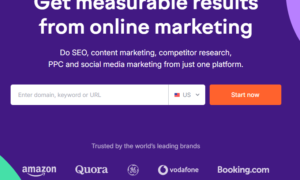I’ve worked with dozens of brands. And here’s what I noticed: the ones crushing it with their Digital PR Agency strategies all do one thing differently. They never stop learning.
Look, SEO isn’t what it was three years ago. Hell, it’s not even what it was six months ago. If you’re not staying current, you’re losing ground while your competitors eat your lunch.
Source: https://unsplash.com/photos/man-standing-in-front-of-people-sitting-beside-table-with-laptop-computers-gMsnXqILjp4
Why Most Marketers Fall Behind (And How to Avoid It)
Here’s the brutal truth. Most people treat SEO like a one-time checkbox. They read one blog post from 2019 and think they’re set.
That’s like learning to drive and never checking the rearview mirror again.
The landscape shifts. Google updates algorithms. User behavior changes. AI tools emerge. If you’re not plugged into the right resources, you’re building strategies on outdated information.
I’ve seen companies waste six figures on tactics that stopped working years ago. All because they weren’t following the right voices.
The Resources That Actually Move the Needle
Search Engine Journal
This one’s non-negotiable. Search Engine Journal covers everything from algorithm updates to link building strategies.
I check it every morning with my coffee. The breaking news section alone has saved me from countless SEO disasters.
Their contributor network includes people actively running campaigns right now. Not theory. Real execution.
Moz Blog
Moz has been around forever for a reason. Their Whiteboard Friday videos break down complex concepts into simple frameworks.
When I need to explain technical SEO to clients, I send them Moz content first. Rand Fishkin built something that translates geek-speak into human language.
Plus their keyword research tools integration means you’re learning and implementing simultaneously.
Ahrefs Blog
If you want data-driven insights, Ahrefs is your spot. They run massive studies on millions of websites.
I use their content when I need to back up strategy recommendations with hard numbers. Nothing convinces a skeptical CMO like statistical evidence from billions of pages.
Their tutorials on competitor analysis are ridiculously detailed. Follow their step-by-step guides and you’ll uncover opportunities your rivals don’t even know exist.
SearchInventure Insights
Here’s one you might not know yet. SearchInventure publishes case studies that show actual campaign results.
Not theoretical “this might work” content. Real campaigns with real numbers.
I’ve implemented three strategies I learned from their blog in the last quarter alone. Two of them increased organic traffic by over 40% for my clients.
Their focus on digital PR integration with SEO is exactly what modern marketing needs.
Specialized Resources for Advanced Tactics
Backlinko
Brian Dean’s Backlinko is where I go for deep dives. Each post is practically a mini-course.
His skyscraper technique changed how I think about content creation. Instead of churning out mediocre posts, I focus on creating definitive resources.
Quality over quantity isn’t just a saying here. It’s a tested methodology with proven results.
Google Search Central Blog
Go straight to the source. Google Search Central tells you exactly what Google cares about.
When they publish guidance, that’s not a suggestion. That’s the rulebook.
I bookmark every announcement they make. Then I audit my strategies against their recommendations. Staying aligned with Google’s direction isn’t optional.
Tools That Double as Learning Platforms
SEMrush Blog
SEMrush doesn’t just sell software. Their blog teaches you how to actually use SEO tools effectively.
I recommend their content to everyone asking “I have all these tools, now what?” The practical application guides turn data into actionable strategies.
Their industry reports help me spot trends before they become obvious.
Neil Patel’s Blog
Love him or hate him, Neil Patel produces content that converts theory into tactics. His blog posts include specific action steps.
I appreciate that he doesn’t gatekeep information. He gives away strategies that most consultants would charge thousands to reveal.
His YouTube channel complements the blog perfectly for visual learners.
Building Your Daily Learning Routine
Here’s my system. I don’t read everything every day. That’s impossible and honestly, it’s overkill.
Instead:
- Monday: Check Search Engine Journal and Google Search Central for updates
- Wednesday: Deep dive into one long-form guide from Ahrefs or Backlinko
- Friday: Review case studies from SearchInventure and industry news roundups
This takes maybe 45 minutes total across the week. But it keeps me sharp without overwhelming my schedule.
I also set Google Alerts for major algorithm updates. When something drops, I pause everything and read the analysis from multiple sources.
FAQ Section
How often should I check these SEO resources?
At minimum, check for major updates weekly. For competitive industries, daily monitoring of news sources keeps you ahead.
Are paid SEO courses worth it compared to free blogs?
Free blogs give you 80% of what you need. Paid courses help when you need structured learning paths or niche specializations.
Which resource is best for local SEO specifically?
Search Engine Journal and Moz both have dedicated local SEO sections with actionable tactics.
How do I know if SEO advice is still current?
Check publication dates and cross-reference with Google’s latest guidance. If multiple trusted sources report the same thing, it’s probably solid.
Should I follow individual SEO experts on social media too?
Yes. Twitter and LinkedIn often break news faster than blogs. Follow the authors behind these resources for real-time insights.
The Bottom Line
SEO success isn’t about knowing everything. It’s about knowing where to find current, accurate information when you need it. These resources have collectively saved me from countless mistakes and revealed opportunities I would’ve missed otherwise. They’re not just reading material. They’re competitive advantages.
Bookmark them. Check them consistently. Apply what you learn. And if you’re working with a Digital PR Agency, make sure they’re pulling from these same sources to keep your strategies cutting-edge.



































